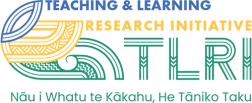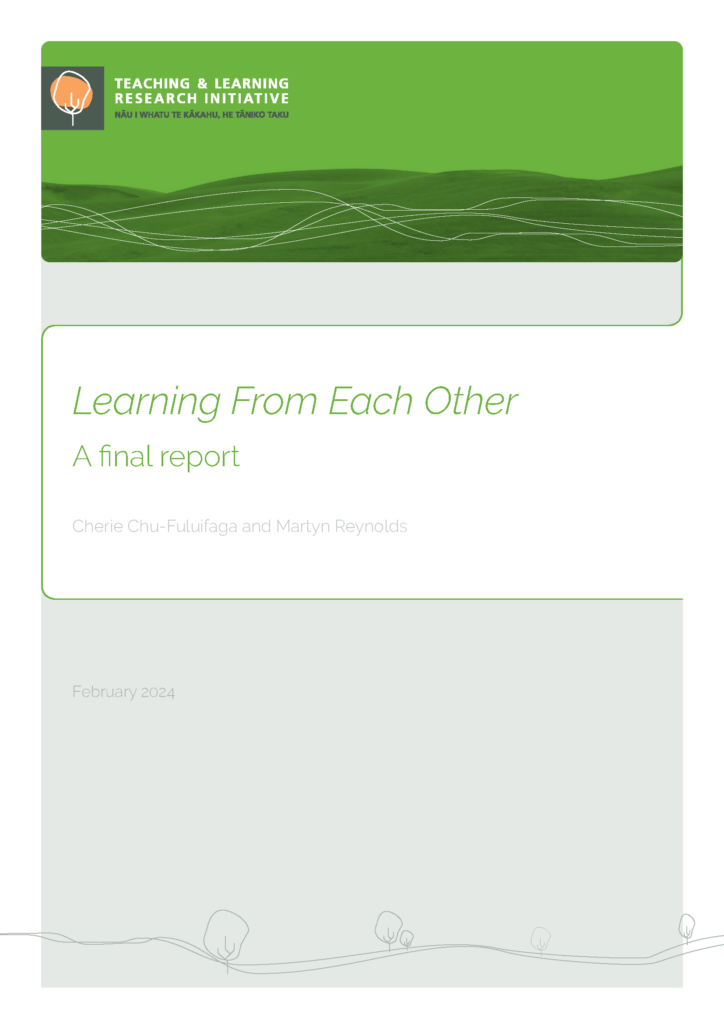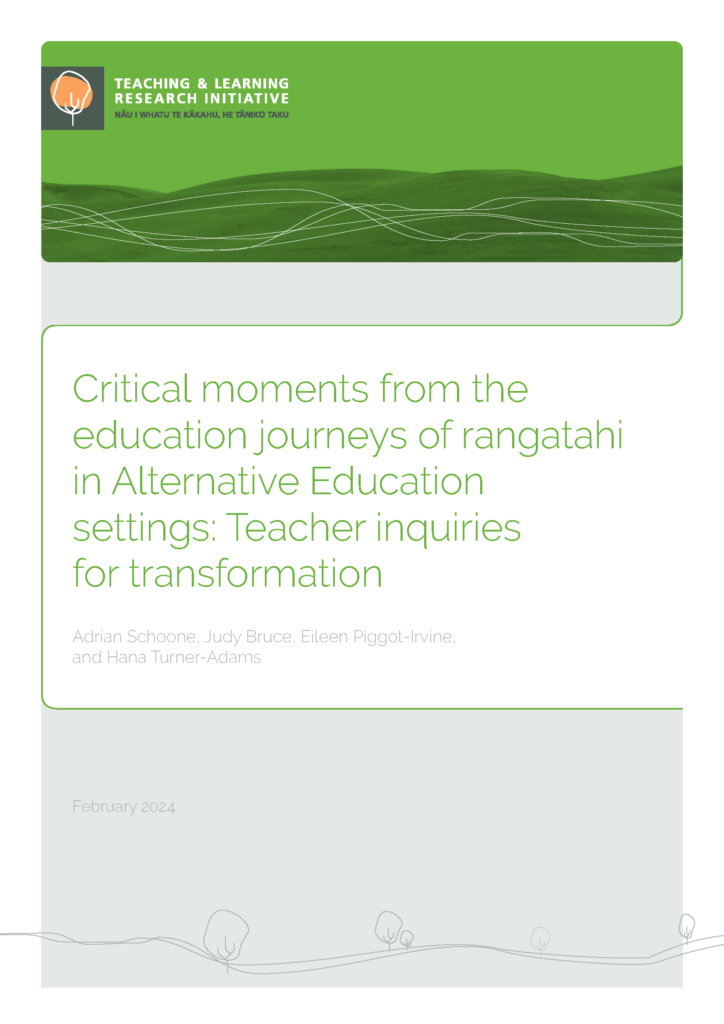Introduction
Currently, there are gaps in our knowledge about values development in New Zealand schools. we do not know what teachers, curriculum leaders and principals believe and know about values implementation in the new curriculum, nor do we know about the effect on student learning of current implementation strategies for teaching values. This study aims to explore (a) the ability of schools to integrate values into their teaching and learning programmes, and (b) the effect of approaches taken to implement values throughout the school.
Key findings
- The most favoured strategies for teaching values included teacher role modelling, using the “teachable moment” and explicit teaching of values.
- The most preferred strategies for assessment of values were student self-assessment and teacher observation of values evident in student behaviours.
- Teachers indentified a need to establish common understandings of values with students, and a common language to interpret such understandings.
- The personal values or beliefs that teachers hold may affect their commitment to values implementation in their school.
Major implications
- Further professional development will be required to support teachers to develop their knowledge base and practical applications of values teaching and learning.
- Attention to values teaching, learning and assessment should be an integral part of New Zealand primary and secondary teacher education programmes.
- Further research work can be undertaken in exploring multiple perspectives of the effectiveness of values teaching, and in identifying features of best practice.
The research
Research background
In reviewing the international literature on values education, universal questions arise that underline the complexity of the debate within the field: what and whose values are to be taught in a school curriculum? Are values “taught” explicitly, or “caught” where values are left implicit? Such questions are equally applicable in the New Zealand education context.
Within the New Zealand school curriculum, there has been a lack of research into the nature and effect of values (Keown, Parker, & Tiaiwai, 2005). Because values are one of the three pillars of the “new” New Zealand Curriculum (2007), together with key competencies and essential learning areas, it seemed opportune to direct research attention in this area. New Zealand research studies on values in the curriculum have been sporadic and predominantly primary school-oriented. Topics have included a review of research undertaken in the Waikato Values in the Curriculum Project in the 1990s (Keown & McGee, 2000); a review of the Living Values Project (Keown, 2002); the effect of character education in schools (Heenan, McDonald, & Perera, 2004, 2007); and a number of masters’ theses that investigated, for example, integrating a programme of philosophy for children in a primary classroom (Cook, 2003) and the role of character education in two primary schools (Neilsen, 2003). More recent OECD studies by Lang (2010) and Satherley (2011) focused on New Zealand year 9 students’ achievement in civic knowledge and citizenship compared to equivalent-aged students in other countries.
In comparison, the international literature is replete with examples of research and practical activity. A recent edition of the International Research Handbook on Values Education and Student Well-being (Lovat, Toomey, & Clement, 2010) points to a range of themes and teaching strategies that are germane to our New Zealand school environment. For example, Australian primary school research suggests that effective pedagogical practices are based on the explicit teaching of values (Dally, 2010) through making values tangible and concrete (Holdsworth, 2010). on the other hand, there is support for the teacher to be a facilitator and learning guide, and for students to be “co-creators” in the values learning process (Small, 2010).
In terms of students’ practical values learning, examples abound in the British and Australian literature of student action teams (SATs) which enable students to take action on issues of interest to the community (Toomey, 2010). More broadly, global attention is being directed toward student well-being and its positive influence on academic progress, as well as its synergies with affective and social dimensions. Clement’s (2010) summation of values’ pervasive influence across school constituencies points to a need for studying the effect of values implementation in the New Zealand Curriculum:
Consideration of the interrelation of values education and student well-being at school leads to the conclusion that student well-being is a positive observable outcome of the implementation of values as they are embedded in educational policy, leadership administration, and the explicit and hidden curriculum, and also as given tangible expression in pedagogical practices and the web of relationships among the various stakeholders of a school. Recent findings of the neurosciences have underscored the fact that in order to be effective, education must engage students across affective, cognitive and social domains.
Clement (2010, p. 54)
Research questions
The principal research question was: “What has been the effect of the values statement in the New Zealand Curriculum (2007) on teaching and learning?”
Within this, there were three sub-questions:
- How are values being implemented in each school’s curriculum?
- How do teachers perceive the process of values implementation and its effect on teaching and learning?
- How do students perceive the effect of values teaching on their learning?
Research design and methodology
The theoretical framework for this research project was based on interpretivism. The aim of inquiry within the interpretive paradigm is to understand and reconstruct the meanings that people hold about values teaching and learning.
The sample of two intermediate and two secondary schools (co-educational and single-sex) was selected to reflect age groupings (11–17-year-olds) that had not received research attention on values; to reflect differing decile levels; and to stand outside schools of special character that would have a natural propensity toward values education.
Quantitative data were collected using a structured survey of 90 teachers. This survey comprised a Likertscale assessment of the importance of items in the new curriculum statement regarding values and desired outcomes, and a series of open-ended responses that focused on teachers’ perceptions of values implementation in their particular school settings. Qualitative data were collected from multiple sources: documentary sources; semi-structured interviews with 12 school leaders, focus group interviews of 20 students and 20 teachers, and a values learning log completed by the students.
Quantitative survey data were analysed using an SPSS software programme. Qualitative data collected from all forms of the interview were transcribed and checked for accuracy by the researchers. Likewise, data from school documentation and the student learning logs were recorded and coded thematically using a process of constant comparative analysis. Analysis of the teacher survey was used to inform development of a schedule of individual interviews with the board of trustees’ chairperson, the school principal, the curriculum leaders, and the teachers as an interactive combination of data collection, ongoing analysis and interpretation of results, triangulated across multiple data sources.
Findings
Values in governance
At the macro level of school governance, values played a key role in delivering each school’s educational philosophy and as the foundation for the school charter. The two intermediate schools made explicit reference to their values in their strategic and curriculum planning. one secondary school used the staff handbook to promote their philosophical underpinnings and as a means of sharing its core educational beliefs and values with staff new to the school.
Values teaching
Teachers’ perceived level of knowledge about the eight listed New Zealand Curriculum values was uniformly high. A higher proportion expressed most confidence about the values of respect and integrity. A lower proportion felt less confident in their knowledge of diversity and ecological sustainability.
Teachers valued respect, integrity and excellence as the three values of most importance to them. Interestingly, a similar pattern occurred in teachers’ ranking of key values that they emphasised in their planning and teaching, and in values that they taught explicitly; that is, respect, excellence and innovation. when the students were asked to rank their top three values of most importance to them, they identified this order as integrity, respect and equity.
There was equivocal support among teachers on whether values should be taught separately or integrated into classroom learning. However, there was greater unanimity about the most preferred teaching sequence, which was to target values for explicit teaching before integrating them into the classroom environment or a particular context or whenever the “teachable moment” presented itself.
The three most favoured strategies for teaching values were teacher role modelling, making effective use of the “teachable moment”, and explicit teaching of a particular value through role plays and dramatic presentations.
There was also an appreciation of a common understanding of key values between student and teacher, enhanced by group discussion, repetition, story telling and positive reinforcement.
Finally, teachers identified a need for increased professional development opportunities to support their understanding of values-based teaching. Suggestions included how to define values from a student perspective, exposure to a range of values-based classroom activities, and how to incorporate values into their pedagogy.
Values learning
The use of assessment tools to determine students’ learning of values was a problematic area for all teacher respondents. Fewer than half of the teachers surveyed made moderate to extensive use of formative assessment activities, whereas a lower proportion used summative assessment strategies. The most preferred assessment strategies included student self-assessment and teacher observation of values evident in student behaviours. A secondary teacher drew attention to the complexity of reporting on values when student behaviours may differ according to their context: “I don’t want to see a student report saying your maths teacher thinks you’re very honest, while your English teacher says you’re very dishonest”.
Commonly identified positive outcomes from values teaching and learning included preparation for responsible citizenship, preparation for life-long learning, providing a balanced outlook on life, and creating a caring and safe school learning environment. Conversely, commonly identified barriers to values implementation included values conflict between home and school; for example, parents condoning absenteeism, and the challenge of making values sufficiently explicit for students to learn from.
Challenges
Working to a homogenous set of values in the New Zealand Curriculum does not necessarily align with individual student interpretations. Nor do students present their values learning in easily identifiable ways—as one teacher noted, “Some students are able to express their values because they are more vocal, whereas others are not so vocal and may appear to be valueless”.
One of the pertinent findings was teachers’ identification of the need to establish a common understanding of what values mean to both students and teachers, and a common language or discourse by which to interpret such understandings. For example, students’ values learning logs recorded interpretations of their most important values within the following parameters:
- excellence, innovation and curiosity: associated with classroom learning only
- respect: contained within the student-teacher relationship
- equity: associated with giving people “a fair go”
- community and participation: associated with group work in class and participation in extra-curricular activities.
Major sector implications
Implications for school leaders
It will be important for school leaders to support teachers (and students) to increase their knowledge base and practical applications of values-based teaching and learning, particularly in areas in which they feel least confident. Teachers felt less confident when working with values of diversity and ecological sustainability. Similarly, students suggested that they found values of equity and ecological sustainability the most challenging to identify with (the latter value being commonly associated with “picking up rubbish”). Given the challenge of competing values between school and some families, it would be timely for school leaders to revisit the manner in which they create “educationally powerful communities through school-home relationships” (Robinson, Hohepa, & Lloyd, 2009, pp. 160–166). This is particularly relevant to shared values and how those values could have an effect on improving student achievement and behaviour.
Another research finding revealed links between the values that teachers believed in personally and similar values that teachers emphasised in their planning and explicit teaching practices, namely respect, integrity, excellence and innovation. This values congruence continued in teachers’ perceptions of which curriculum values their school upholds and in their preferred sequence of teaching values to students. Does this then imply that, for teachers to commit to the New Zealand Curriculum values, they must first believe in them at a personal level? Individual teacher comments support that view; for example:
- “If it’s not a value important to me, then I feel it is not something I need to incorporate into my teaching.”
- “If a value is to be promoted successfully, students must see your enthusiasm for/belief in that particular value.”
- “You need to ‘know’ what you’re teaching and have ‘lived’ it to some degree.”
From a research perspective, it is of interest to note that Kouzes and Posner’s (2007) American research on organisational culture revealed that people’s personal values are the “route to loyalty and commitment, not organisational values” (p. 56).
Therefore, this finding may have implications for school leaders to determine the level of teachers’ personal buy-in to the curriculum values, if the teachers are to commit to values implementation in their school.
Implications for teacher educators
Since key competencies, essential learning areas and values constitute the three “pillars” of the school curriculum, it follows that an understanding and application of values teaching should be an integral part of initial primary and secondary teacher education programmes in New Zealand. Attention to philosophical and implementation issues would provide student teachers with an understanding of the broader scope of pedagogy now required, and with a values context to take with them into their school practicums.
Implications for in-service providers
There is an evident need for further professional development opportunities to be made available to teachers to support their professional learning about values teaching. Specific areas for attention have been suggested in reaching common understandings between students and teachers on what constitutes a “value,” and establishing a common discourse by which understandings can be shared.
Teachers are keen to learn how to incorporate values features into their classroom pedagogy and, in particular, how to draw on formative assessment techniques that would give a valid indication about the level of a student’s values learning. This need is prompted by what teachers perceive to be challenges in the subjective and context-based nature of values acquisition.
Implications for educational researchers
A brief overview of the values research literature has indicated gaps in our understandings of values teaching and learning but also an impetus for determining influential building blocks that inform the holistic education of the child. Implications of findings suggest to New Zealand educational researchers that there is further work to be carried out in the following areas:
- bench-marking New Zealand’s emerging classroom experiences of values teaching with international research and practical applications in other countries, in the manner of results from the International Civic and Citizenship Education Study
- strengthening the literature on values implementation in schools through further in-depth studies that include teachers’ and principals’ perspectives, as well as students’ values, attitudes and subsequent behaviours
- exploring how schools integrate their values system through governance, management, curriculum and pedagogical practices
- determining best-practice features of values teaching and learning, as schools progress the introduction of the “new” curriculum.
Conclusion
Overall, this research project has signalled a need for pan-education support to be given to teachers as they work to improve values implementation in the New Zealand Curriculum.
References
Clement, N. (2010). Student well-being at school: the actualisation of values in education. In T. Lovat, N. Clement, & R. Toomey, (eds.), International research handbook on values education and student well-being (pp. 37–62). Dordrecht, the Netherlands: Springer.
Cook, S. (2003). The integration of philosophy for children in the teaching and learning curriculum of a New Zealand classroom. Hamilton, New Zealand: University of Waikato.
Dally, K. (2010). A teacher’s duty: An examination of the short-term impact of values education on Australian primary school teachers and students. In T. Lovat, N. Clement, & R. Toomey, (eds.), International research handbook on values education and student well-being (pp. 503–520). Dordrecht, The Netherlands: Springer.
Heenan, J., McDonald, G., & Perera, K. (2004). Character education in New Zealand schools. Auckland: Unitec New Zealand.
Heenan, J., McDonald, G., & Perera, K. (2007). Character education in New Zealand schools. Auckland: Unitec New Zealand.
Holdsworth, R. (2010). Students leading in investigating and enacting values in school communities. In T. Lovat, N. Clement, & R. Toomey, (eds.), International research handbook on values education and student well-being (pp. 849–866). Dordrecht, The Netherlands: Springer.
Keown, P. (2002). Living values project evaluation. Hamilton, New Zealand: University of Waikato and Ministry of Education.
Keown, P., & McGee, C. (2000, July). How do teachers and students view values programmes: A workshop based on the main findings of the Values in Social Studies Project. Paper presented at the Quality Public Education Coalition Values Education Conference, 21–23 July, Massey University, Palmerston North, New Zealand.
Keown, P., Parker, L., & Tiaiwai, S. (2005). Values in the New Zealand Curriculum: A literature review on values in the curriculum. Wellington, Ministry of Education.
Kouzes, J. M., & Posner, B. Z. (2007). The leadership challenge (4th ed.). San Francisco, CA: John Wiley & Sons.
Lang, K. (2010). What do New Zealand students understand about civic knowledge and citizenship? Results from the International Civic and Citizenship Education Study. Wellington, Ministry of Education.
Lovat, T., Clement, N., & Toomey, R. (eds.). (2010) International research handbook on values education and student well-being. Dordrecht, The Netherlands: Springer.
Ministry of Education. (2007). The New Zealand Curriculum. Wellington, New Zealand: Ministry of Education.
Neilsen, B. J. (2003). Character education and school communities: The experiences within two New Zealand primary schools. unpublished master’s thesis, University of Otago, Dunedin, New Zealand.
Robinson, v., Hohepa, M., & Lloyd, C. (2009). School leadership and student outcomes: Identifying what works and why. Best evidence synthesis iteration [BES]. Wellington, Ministry of Education.
Satherley, P. (2010). What do our students think about New Zealand, democracy and freedom? New Zealand results from the International Civic and Citizenship Education Study. Wellington, Ministry of Education.
Small, T. (2010). Values in motion: From confident learners to responsible citizens. In T. Lovat, N. Clement, & R. Toomey, (eds.), International research handbook on values education and student well-being (pp. 919–935). Dordrecht, the Netherlands: Springer.
Toomey, R. (2010). Values education, instructional scaffolding and student well-being. In T. Lovat, N. Clement, & R. Toomey, (eds.), International research handbook on values education and student well-being (pp. 849–866). Dordrecht, the Netherlands: Springer.






